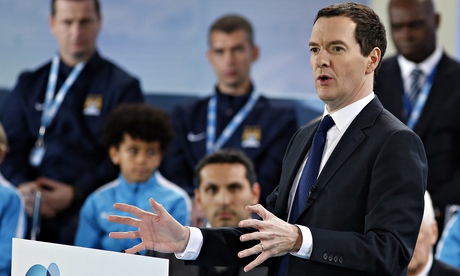
George Osborne, not the sort of chap traditionally associated with Manchester City fans, opened the club’s astonishing new training academy this week, hailing it as a “benchmark” for investment in the north of England – where, he tells us repeatedly, he is creating a “powerhouse”.
The complex, built in one of Manchester’s and Britain’s poorest areas by Sheikh Mansour of the ruling Al Nahyan family in oil-rich Abu Dhabi, is the ultimate hothouse to train footballers for City and Mansour’s other clubs in New York, Melbourne and Yokohama.
Manchester city council wrought all the public good it could from the investment, with the result that after a generation of blight and deprivation, Abu Dhabi money has financed a new school and leisure centre for community use. But as well as spurring some vital economic activity, this whole football project has also shown Manchester’s true place in the global powerhouse league.
East Manchester, a crucible of the industrial revolution, was still a heartland of industry until the 1980s when more than 150,000 jobs were lost. The council spent £127m public and lottery money building the stadium for the 2002 Commonwealth Games; City moved in afterwards, and in 2008 hit the jackpot with Mansour.
The sheikh has since spent £1.15bn funding the football club, mostly bankrolling massive transfer fees and multimillion-pound salaries for players to win the Premier League. The community facilities for which Manchester is genuinely grateful have been built on 5.5 acres of City’s 80-acre academy, at a cost of £20m – a tenth of the £200m total cost and just over half the £38m that City paid for one player, Sergio Agüero, in 2011.
Since then, the city council has itself suffered £250m cuts, imposed by Osborne. The council last month announced it faces a further shortfall of £59m in 2015-16. Coping options include taking fewer troubled children and vulnerable old people into residential care, “efficiencies” in disability services, reduced spending on mental health, homelessness, youth services, school uniform grants, community projects, galleries, libraries, and ending free swimming for children and over-60s. It anticipates 600 job losses, on top of 3,000 gone since 2011.
Abu Dhabi has oil, and is a powerhouse. “The north of England” remains a long way behind.
Truce hurts
Football is paying tribute to the best of itself this week, remembering the 1914 Christmas truce when English and German troops famously rose from the trenches not to kill each other but to smoke, talk, and kick a ball around. A new Peace Collective version of The Farm’s brilliant anthem All Together Now has been released to honour the truce’s centenary.
But Peter Hooton, the lead singer who wrote the song, was motivated as much by the later ban on such outbreaks of peace, which were considered prejudicial to the “good order of military discipline”. The 1914 truce was never repeated through the cruel years that followed.
Foggy feast
Well done Carl Fogarty, the most successful world superbike racing champion ever, now known to a new generation as the winner of I’m a Celebrity Get Me Out of Here. My daughters insisted on watching this series, as it was all they were talking about at school. So on Sunday I watched Fogarty’s task: eating the end of a camel’s penis.
His grimace, that it was “all gristly”, is an image I’m finding hard to shake off. It seems a bit cruel to have inflicted it on the nation, so soon before the Christmas feasts.

